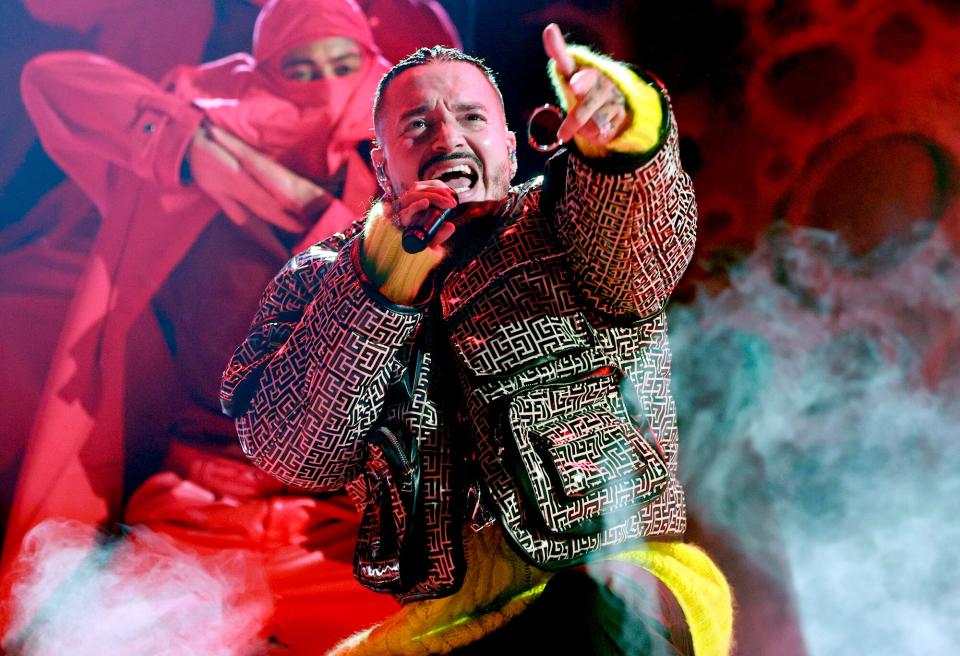J Balvin Apologizes for 'Perra' Music Video After Clip Pulled from YouTube amid Backlash

Aaron J. Thornton/Getty J Balvin
J Balvin is speaking out after the music video for his song "Perra" was removed from YouTube amid backlash over its portrayal of Black women.
After its debut on Sept. 10, the "Perra" music video received criticism that it perpetuated "misogynoir" for showing the Colombian singer, 36, walking with two Black women on leashes. Rapper Tokischa, who collaborated on the track, was also slammed for posing in a dog house in the music video.
Earlier this month, the video quietly disappeared from YouTube, though an audio-only version of the track is still available to stream on the platform. The song itself features lyrics about dogs in heat. "Perra" translates to "bitch" or "female dog."
On Sunday, Balvin shared a series of clips on his Instagram Story, apologizing for the video and claiming he was the one who had it taken down.
"I want to say sorry to whomever felt offended, especially to the Black community. That's not who I am," he said, per Pitchfork.
RELATED: J Balvin Music Video Quietly Removed from YouTube amid Backlash for Depiction of Black Women
Balvin also apologized directly to his mother and added that he has "always been about tolerance, love, and integration, just as I've always liked to support new talent — in this case Tokischa, a woman who supports her people, her community and empowers women," according to Rolling Stone.
Tokischa, 25, told Rolling Stone that she's sorry about how the video has been interpreted, sharing that she was inspired to write the song while having sex and meant for it to be a play on the phrase "perra en calor."

John Parra/Telemundo/NBCU Photo Bank via Getty Images
"I said that if I'm going to talk about 'perra en calor,' I'm going use all the language associated with dogs: 'perro de raza' [purebred], 'Purina'—which is a word with a double meaning because here, that's what you call a product that's really pure… 'la perrera' [the pound]. It was very conceptual," she explained. "If you, as a creative, have a song that's talking about dogs, you're going to create that world."
"I understand the interpretation people had and I'm truly sorry that people felt offended. But at the same time, art is expression," the artist continued, adding that she is supporting Balvin through this "difficult moment."
"He came here to record with me and to share his platform with me," Tokischa said. "Now I'm like 'What did I get Jose in?' "
RELATED: J Balvin Learned that 'Being Rich' Means 'Being Healthy, Happy and at Peace' After Surviving COVID

Emma McIntyre/Getty
The video's director Raymi Paulus (who is also Tokischa's manager) told Rolling Stone that the video was meant to be "satirical representation" of the "many contexts of the word 'perra,' " sharing his stance on why he felt the video was taken out of context.
"Our creative process never aimed to promote racism or misogyny," he said. "The Dominican Republic is a country where most of the population is Black and our Blackness is predominant in underground scenes, where the filming took place, and which was the subject of the video's inspiration. 'Perra' was a video filmed in the neighborhood, with people from the neighborhood, and the use of people of color in 'Perra' was nothing more than the participation of our people in it."
Never miss a story — sign up for PEOPLE's free daily newsletter to stay up-to-date on the best of what PEOPLE has to offer, from juicy celebrity news to compelling human interest stories.
Paulus also addressed Colombian Vice President Marta Lucia Ramírez's criticism of the music video. In an open letter translated to English, the politician wrote earlier this month that the song has "direct and openly sexist, racist, machista and misogynistic expressions that violate the rights of women, comparing them to an animal that must be dominated and mistreated," Billboard reported.
"Regarding the vice president of Colombia, my [Colombian] friends tell me that the elections are approaching," Paulus said.

 Yahoo Movies
Yahoo Movies 
